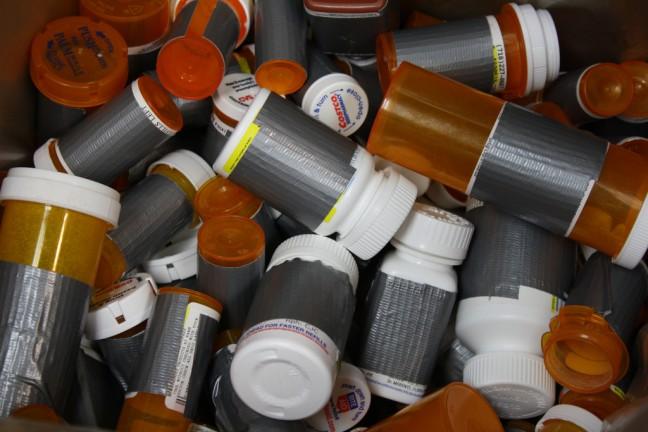Wisconsin institutions and community organizations encouraged people to dispose of unused or expired prescription medications responsibly to avoid both contaminating water supply and someone else taking the medication.
Danielle Long, criminal justice program and policy analyst for the Wisconsin Department of Justice, said the Drug Enforcement Administration has guidelines for how medications should be collected and disposed.
The Wisconsin DOJ partners with local local law enforcement agencies to collect medications in lock boxes and Covanta, a waste management company in Indiana, Long said. The medications are collected from the collection sites, packaged and shipped to Covanta to be incinerated. The burning waste is turned into energy, Long added.
The medications must be removed from their original containers to protect patient identity, and the plastic containers should be recycled, Long said.
The Wisconsin DOJ coordinates two events a year, called Prescription Drug Take-Back Day, during the spring and fall to collect medications and spread awareness of the issue, Long said.
Free clinic meant as temporary solution, connects patients to providers, resources
The most recent Prescription Drug Take-Back Day occurred Oct. 26. Long said there were 160 events and 280 law enforcement agencies registered to participate. There are more than 475 permanent drop boxes, including locations at pharmacies, hospitals and clinics, Long said.
Safe Communities is a non-profit that seeks to “bring together public and private sector partners to save lives, prevent injuries and make our community a safer place,” according to its website. It receives funds from various city and village boards, the Dane County government, University of Wisconsin Health and other hospitals and health services.
Safe Communities offers MedDrop, a service that allows community members to dispose of medications in a safe way. There are 17 MedDrop locations in Dane County. MedDrop partners with local pharmacies and local law enforcement to collect unused or expired medication, according to the program’s website.
Cheryl Wittke, the executive director of Safe Communities, said MedDrop participates in the Prescription Drug Take-Back Day events, including the Oct. 26 event.
Candace Peterson, the grant coordinator for Partnership for Success, wrote in an email the total collected weight of prescription drugs across Dane County was 1153.5 pounds during the Oct. 26 event. Safe Communities is a grant recipient of PfS.
UW economics professors find Medicaid expansion could save Wisconsin $100 million
“I think it’s crucial for us to get unwanted and unused medications out of homes,” Long said. “We’re really trying to get the word out.”
People tend to keep medications even if they no longer use it or need it, Long said. She brought up potential consequences, such as children finding medication and consuming them. She added that people may sometimes also give their medications, like pain reliever, to someone else without thinking of the consequences.
More than 70% of people who abuse prescription medications obtain them from friends or relatives, according to the Wisconsin Department of Health Services.
Medications can be deactivated by crushing them and mixing with coffee grounds or kitty litter, Long said. Another option is putting medications in deactivating solutions.
Medications that are disposed of improperly can lead to water contamination, Long said.
Medications should not be flushed down the toilet because they can negatively affect aquatic life, although there is little research on how this could affect humans, according to the Madison Metropolitan Sewerage District website.
Madison city council signs resolution declaring racism to be public health crisis
Emily Jones, pollution prevention specialist at MMSD, said pharmaceuticals should not be thrown in the trash because they can seep into the water supply while in the landfill.
Jones said the waste water department does not have the technology to remove pharmaceuticals from water. This means pharmaceuticals can make it into treated water and be released into the environment.
“Pharmaceuticals are present, but in the parts per trillion level,” Jones said. “So it’s really really low.”
But this shouldn’t minimize concern, Jones said.
Upgrades are expensive and relatively inefficient and reducing pollution overall, according to the MMSD website. The upgrades would increase the price of sewer rates.
As methamphetamine usage rates soar in Wisconsin, opioids remain key issue in Madison
The goal is to prevent pollution in the first place. This includes educating the community of the consequences, Jones said.
Amanda Wegner, communications and public affairs manager at MMSD, said this issue is not unique to the Madison area and it is a universal concern.
“We’re very lucky here in the Madison area to have so many pharmacies, community centers and law enforcement agencies that always have MedDrops available,” Wegner said.
Wittke said collecting the medication is an expensive operation. Before funding, Safe Communities had to raise $40,000 a year to dispose of pharmaceuticals, Wittke said.
Safe Communities doesn’t have as big of a budget, but the money is now used for educational purposes and purchasing ads to promote the take-back events, Wittke said.
“We have more money to spend on public education and expanding the locations,” Wittke said.












